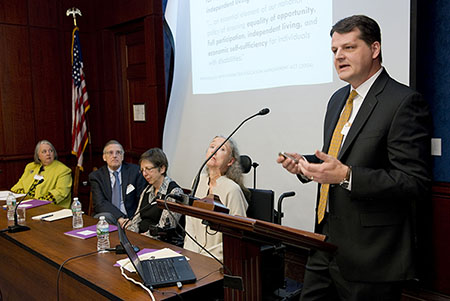Vanderbilt Kennedy Center (TN UCEDD, LEND, IDDRC) Member Erik Carter Serves as Expert Speaker at Congressional Briefing
April 25, 2016

|
Changing post-school pathways of youth and young adults with severe disabilities was the focus of Erik Carter's presentation at a Congressional briefing, March 4, 2016, sponsored by the Friends of the Institute of Education Sciences (FIES). Carter, Ph.D., is professor of Special Education and Vanderbilt Kennedy Center (TN UCEDD, LEND, IDDRC) member.
The mission of FIES is to increase the visibility of research funded by Institute of Education Sciences (IES), to strengthen IES programs by supporting strong and comprehensive reauthorization bills, and to see adequate and sustained funding for the research that IES supports.
The briefing, held in cooperation with Honorary Co-Chairs Sen. Lamar Alexander, Rep. Suzanne Bonamici, and Rep. Michael Honda, addressed "Transition to Adult Productivity: Supporting Secondary Students with Disabilities in Successful Movement to College and Career."
Expert testimony provided by the four nationally invited speakers related to research of IES's National Center for Special Education Research (NCSER), which has funded research to explore data, to innovate and to develop programs, and to assess programs to prepare students with disabilities for life after high school. NCSER-funded programs have helped students with disabilities gain employment, succeed academically, and thrive socially after graduating from high school. More than 400,000 students with disabilities exit high school each year.
Carter's remarks were on the theme of "Toward a Future of Flourishing: Changing the Post-School Pathways of Youth and Young Adults with Severe Disabilities."
Students with severe disabilities usually need ongoing support to take part in many daily activities, they typically have cognitive impairments, and they often have complex communication challenges. Carter emphasized the point, supported by research, that the presence of a severe disability is not a reliable predictor of young people's aspirations for their lives.
"Young people with severe disabilities want the very same things as anyone else," Carter said, "a satisfying job, close relationships, a comfortable and safe place to live, a college degree, involvement in their community, friends they can count on, a chance to give something back, and an opportunity to be part of caring communities."
While the presence of a disability is not a reliable predictor of what young people want for their lives, it is a highly reliable predictor of what Carter characterized as "the persistent gap between aspirations and outcomes, which lies at the heart of where IES is making such powerful changes."
Only 26% of young adults with severe disabilities nationally were working for pay in the first 2 years after leaving high school, which manes that 3 out of 4 young adults were not working. Of those who were working, almost half (43%) held jobs in segregated settings (i.e., most or all other employees also had disabilities) and most earned fairly low wages.
Carter summarized a model intervention, Project Summer: Connecting Youth with Severe Disabilities to Early Work Experiences, funded by NCSER.
The research team found that students without disabilities who had held paid jobs while still in high school were more than twice as likely to be working after high school. Students who had stronger social and independence skills while in high school were more than 2.5 times more likely to be working. When parents had high expectations for paid community employment when they were in high school, their students were 5 times as likely to work.
In statewide employment patterns for students with severe disabilities, only 15% of students with severe disabilities held a summer job, compared to 60% or more of young people with disabilities nationally who did summer work. Teacher expectations were a significant predictor of whether students with severe disabilities work during high school. Those who had teachers with high expectations were 15 times more likely to obtain paid community employment.
The intervention model implemented for Youth Summer Employment included undertaking summer-focused planning, establishing employer liaisons, doing community resource mapping, holding community conversations with a wide range of stakeholders to brainstorm solutions, and providing community connectors.
When schools implemented these strategies, 66% of youth with severe disabilities were successful in obtaining paid, inclusive jobs or volunteer experiences in their communities, compared to less than 19% of youth who did not receive the intervention. All made above the minimum wage.
Carter praised IES's research investment for focusing on a group of young people for whom society historically had held low expectations. Research demonstrates that schools and communities have the capacity to support employment of youth with severe disabilities.
"These findings have now been incorporated into statewide employment systems change grants across the country," Carter said, "and we teach these strategies in university special education teacher preparation programs."







